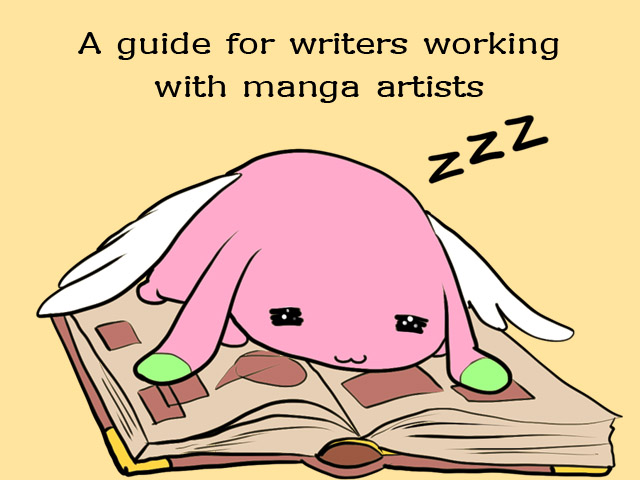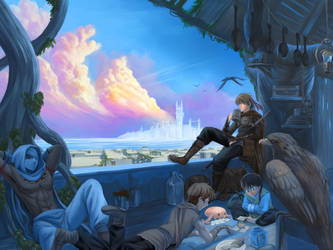ShopDreamUp AI ArtDreamUp
Deviation Actions
Description
P A N E L S----------------
From my experience of working with several writers... unless they go with a very specific set of management, the average is 1 page novel = 1-3 pages manga.
I have guided writers into doing nearly 90%-95% accurateness on manga pages estimate when they are working with me.
Here's how you can self-estimate your cost:
On average, a manga page is 4-7 panels or less.
(with occasional 8-10 mini panels if story permits, an example would be Hero slashed Villain, a shot everyone's expression on the team.)
1. characters talking: 1 dialogue line a bubble. A panel can have 2-3 lines max.
2. 2 characters talking to each other, 2 dialogue lines form one panel.
3. Character explaining: 3-8 lines will be a page
4. Character action: a sentence of action is one panel, unless some details are ignored.
5. Avoid using semicolon and run on sentences, and avoid writing too much run on dialogue unless the story calls for it.
Using this quideline you can estimate how your script will roughly cost you to turn into manga/comic. (depending on the artist's rate)
Do allow the artists to make changes, it's usually to the project's advantage.
C H A R A C T E R-------------
I also noticed sometimes novels don't call for a specific amount of description on the characters, but that can cause problem when working with an artist, so I included some quide below:
Character looks chart:
Name:
Gender:
Height:
Body type/weight:
Race:
Skin color, eye color:
Hair type, color/hair length:
Clothing:
Important items:
Personality:
Summary of character backgrounds:
Likes and dislikes in clothing, colors, items, feeling:
(example: A blind girl won't dislike or like any colors, she only like comfortable, smooth fabric that feels good on the touch, a sporty guy will dislike any restrictive clothing)
T I P S----------------
Design tips: from working with several writers I did notice some writers have a tendency to design clothing that's either too common, or too black and white in color, literally. I suggest the writer mention to the artist that they can improve the design if they choose. It might produce good results. Try to give as clear/detailed on the character's story/personality possible to prevent designs that are off. Finding reference photos, or even examples of other designs, (have multiple designs ref will prevent copying problems) of what you are aiming for also helps a lot since most artists are very visual.
Freelance tip: If you are commissioning the artist over a long project period, divide the payment up from 20%-50% advances in stages, talk with the artists about it, they are usually happy to work for the money. Pay the final part once the artist is done. Don't give it all in one shot, it kills motivation for the artist's side, nor hold everything back until the end.
Check in tip: DO check in with whoever you are commissioning. Weekly check-in is best. (A project is like homework, when its due weekly, it gets done.)
Project tips: If you have an extremely big personal project that span more than 1-3 volumes, (like 5-10 books) consider the amount of spending, how long you will gain it back, and consider the fact the talent may also become unavailable after a while due to career change, or other causes. It's wise to prepare for back up plans for any long term projects. A typical work contract for anyone is 2-5 years max, so you should be prepared for that.
Contract tip: Do craft and prepare a simple agreement for both parties if you have a long project that is more than 600 dollar or more, you might have to consider tax problem in some countries like USA. It's just safer and clearer on expectations on both parties. The agreement can be done via email or more formally signed as contract.
Printing tip:
I suggest to select a printing format from the start of the project: [link]
That will save you trouble from working with a manga/comic artist who never handled print format before, as sometimes the lack of experience with print can cause them to make poor layout decisions that will cost you later.
Script preparation: Try to get your script as finalized, spell checked, edited as professionally as possible before you hand it to the artist, because usually artists' job is not to do spell checking for you. I think this point is basic for writers, but some writers came to me before with incomplete script, I turned them down. So have your script completed as professionally as you can.
That is all. I will add more if I can think up more points.
This guide is to help writers who will be working with me... as well as other writers and artists, hopefully.
From my experience of working with several writers... unless they go with a very specific set of management, the average is 1 page novel = 1-3 pages manga.
I have guided writers into doing nearly 90%-95% accurateness on manga pages estimate when they are working with me.
Here's how you can self-estimate your cost:
On average, a manga page is 4-7 panels or less.
(with occasional 8-10 mini panels if story permits, an example would be Hero slashed Villain, a shot everyone's expression on the team.)
1. characters talking: 1 dialogue line a bubble. A panel can have 2-3 lines max.
2. 2 characters talking to each other, 2 dialogue lines form one panel.
3. Character explaining: 3-8 lines will be a page
4. Character action: a sentence of action is one panel, unless some details are ignored.
5. Avoid using semicolon and run on sentences, and avoid writing too much run on dialogue unless the story calls for it.
Using this quideline you can estimate how your script will roughly cost you to turn into manga/comic. (depending on the artist's rate)
Do allow the artists to make changes, it's usually to the project's advantage.
C H A R A C T E R-------------
I also noticed sometimes novels don't call for a specific amount of description on the characters, but that can cause problem when working with an artist, so I included some quide below:
Character looks chart:
Name:
Gender:
Height:
Body type/weight:
Race:
Skin color, eye color:
Hair type, color/hair length:
Clothing:
Important items:
Personality:
Summary of character backgrounds:
Likes and dislikes in clothing, colors, items, feeling:
(example: A blind girl won't dislike or like any colors, she only like comfortable, smooth fabric that feels good on the touch, a sporty guy will dislike any restrictive clothing)
T I P S----------------
Design tips: from working with several writers I did notice some writers have a tendency to design clothing that's either too common, or too black and white in color, literally. I suggest the writer mention to the artist that they can improve the design if they choose. It might produce good results. Try to give as clear/detailed on the character's story/personality possible to prevent designs that are off. Finding reference photos, or even examples of other designs, (have multiple designs ref will prevent copying problems) of what you are aiming for also helps a lot since most artists are very visual.
Freelance tip: If you are commissioning the artist over a long project period, divide the payment up from 20%-50% advances in stages, talk with the artists about it, they are usually happy to work for the money. Pay the final part once the artist is done. Don't give it all in one shot, it kills motivation for the artist's side, nor hold everything back until the end.
Check in tip: DO check in with whoever you are commissioning. Weekly check-in is best. (A project is like homework, when its due weekly, it gets done.)
Project tips: If you have an extremely big personal project that span more than 1-3 volumes, (like 5-10 books) consider the amount of spending, how long you will gain it back, and consider the fact the talent may also become unavailable after a while due to career change, or other causes. It's wise to prepare for back up plans for any long term projects. A typical work contract for anyone is 2-5 years max, so you should be prepared for that.
Contract tip: Do craft and prepare a simple agreement for both parties if you have a long project that is more than 600 dollar or more, you might have to consider tax problem in some countries like USA. It's just safer and clearer on expectations on both parties. The agreement can be done via email or more formally signed as contract.
Printing tip:
I suggest to select a printing format from the start of the project: [link]
That will save you trouble from working with a manga/comic artist who never handled print format before, as sometimes the lack of experience with print can cause them to make poor layout decisions that will cost you later.
Script preparation: Try to get your script as finalized, spell checked, edited as professionally as possible before you hand it to the artist, because usually artists' job is not to do spell checking for you. I think this point is basic for writers, but some writers came to me before with incomplete script, I turned them down. So have your script completed as professionally as you can.
That is all. I will add more if I can think up more points.
This guide is to help writers who will be working with me... as well as other writers and artists, hopefully.
Image size
640x480px 93.61 KB
© 2013 - 2024 mayshing
Comments32
Join the community to add your comment. Already a deviant? Log In
Hello! I'm actually in a little bit of a pickle and was wondering if you could help me. My problem is that I would like to try out this idea for a manga, nut i have no skills what so ever in drawing and I was wondering if you knew anyone who doesn't really have anything going on and is and amazing artist (not that your not amazing but you do seem busy). I was wondering if you could make any recommendations?






























